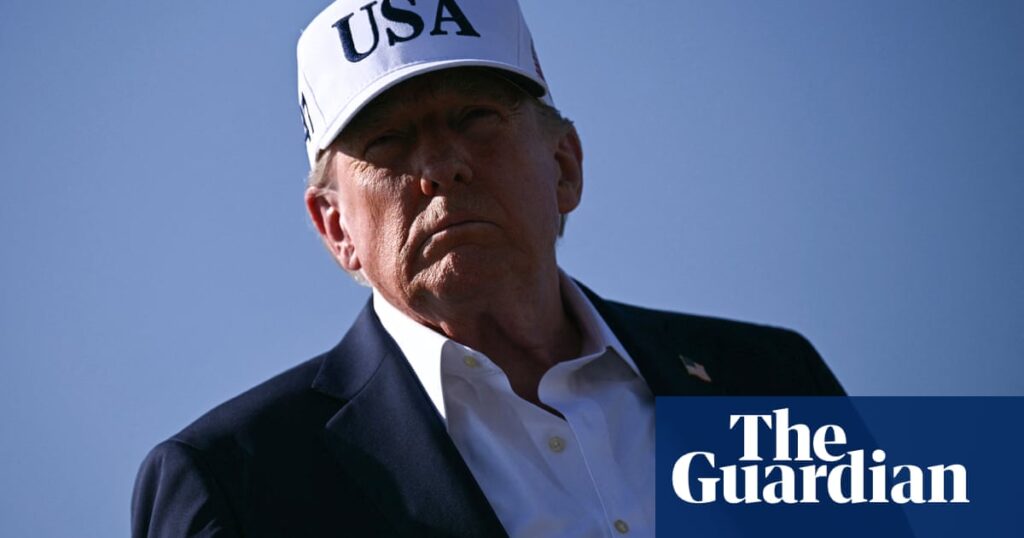Donald Trump has said his administration plans to start sending letters on Monday to US trade partners dictating new tariffs, amid confusion over when the new rates will come into effect.
“It could be 12, maybe 15 [letters],” the president told reporters, “and we’ve made deals also, so we’re going to have a combination of letters and some deals have been made.”
With his previously announced 90-day pause on tariffs set to end on 9 July, the president was asked if the new rates would come into effect this week or on 1 August, as some officials had suggested.
“No, there are going to be tariffs, the tariffs, the tariffs are going to be, the tariffs,” the president began uncertainly. “I think we’ll have most countries done by July 9, yeah. Either a letter or a deal.”
Sensing the confusion, his commerce secretary, Howard Lutnick, jumped in to add: “But they go into effect on August 1. Tariffs go into effect August 1, but the president is setting the rates and the deals right now.”
In April, Trump announced a 10% base tariff rate on most countries and additional duties ranging up to 50%, although he later delayed the effective date for all but 10% duties until 9 July.
The new date of 1 August offers countries a further three-week reprieve but also plunges importers into an extended period of uncertainty because of the lack of clarity around the tariffs.
Stock markets slipped in Asia on Monday amid the confusion. Japan’s Nikkei lost 0.3%, while South Korean stocks fell 0.7%. MSCI’s broadest index of Asia-Pacific shares outside Japan eased 0.1%.
European stocks were mixed. In the UK, the blue chip FTSE 100 index slipped 0.3%, with Shell and BP the biggest fallers on the back of weaker oil prices. The German Dax index rose by 0.3%, while in France the Cac 40 was broadly flat. The Stoxx Europe 600, which tracks the biggest companies on the continent, was also flat.
Industrial metals dropped, with copper down by 0.6% to $9,808 per tonne on the London Metal Exchange. Aluminium fell by 1.1% to $2,561 a tonne on the exchange, where all major metals were trading lower on Monday morning.
In an update on his social media platform Truth Social, Trump said the US would begin delivering “TARIFF Letters, and/or Deals” from noon ET on Monday.
“Any Country aligning themselves with the Anti-American policies of BRICS, will be charged an ADDITIONAL 10% Tariff. There will be no exceptions to this policy,” he added in a separate post, referring to the developing nations bloc that includes Brazil, Russia, India, China and South Africa.
After a summit in Brazil on Sunday, Brics leaders had issued a joint statement raising “serious concerns about the rise of unilateral tariff” measures, which they said risked hurting the global economy.
On Monday, the Chinese government said it opposed tariffs being used as a tool to coerce others. Mao Ning, a spokesperson for the Chinese foreign ministry, said the use of tariffs served no one.
Scott Bessent, the US treasury secretary, told CNN’s earlier on Sunday that several big announcements of trade agreements could come in the next days, noting that the EU had made good progress in its talks.
He said Trump would also send out letters to 100 smaller countries with whom the US does not have much trade, notifying them that they would face higher tariff rates first set on 2 April and then suspended until 9 July.
“President Trump’s going to be sending letters to some of our trading partners saying that if you don’t move things along then on August 1 you will boomerang back to your April 2 tariff level. So I think we’re going to see a lot of deals very quickly,” Bessent told CNN.
Since taking office, Trump has set off a global trade war that has roiled financial markets and sent policymakers scrambling to guard their economies, including through deals with the US and other countries.
Bessent said on Friday that negotiations were focused on 15 to 18 agreements with important partners. So far, Trump has signed deals with only two of the 60 countries he threatened with tariffs in April – the UK and Vietnam.
Indonesia, with which the EU hopes to sign a trade deal by the end of the summer, will sign a deal to import at least 1m tonnes of US wheat annually for the next five years, the country’s flour mills association told AFP on Monday, as Jakarta lays the groundwork to avoid the worst of Trump’s tariffs.


